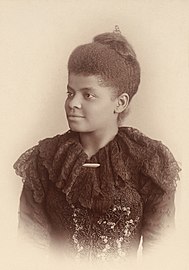 Ida Bell Wells-Barnett (July 16, 1862 – March 25, 1931), more commonly known as Ida B. Wells, was an American journalist, newspaper editor, suffragist, sociologist, Georgist, and an early leader in the civil rights movement. She documented lynching in the United States, showing that it was often used as a way to control or punish blacks who competed with whites, rather than being based on criminal acts by blacks, as was usually claimed by white mobs. She was active in women's rights and the women's suffrage movement, establishing several notable women's organizations. Wells was a skilled and persuasive rhetorician and traveled internationally on lecture tours.
Ida Bell Wells-Barnett (July 16, 1862 – March 25, 1931), more commonly known as Ida B. Wells, was an American journalist, newspaper editor, suffragist, sociologist, Georgist, and an early leader in the civil rights movement. She documented lynching in the United States, showing that it was often used as a way to control or punish blacks who competed with whites, rather than being based on criminal acts by blacks, as was usually claimed by white mobs. She was active in women's rights and the women's suffrage movement, establishing several notable women's organizations. Wells was a skilled and persuasive rhetorician and traveled internationally on lecture tours.Ida Bell Wells was born a slave in Holly Springs, Mississippi in 1862, just before United States President Abraham Lincoln issued the Emancipation Proclamation. Her father was James Wells, and her mother was Elizabeth "Lizzie" Warrenton Wells. Both parents were enslaved until freed under the proclamation. Ida's father was a master at carpentry; he was a "race man" who worked for the advancement of blacks. He was very interested in politics and was a member of the Loyal League. He attended Shaw University in Holly Springs (now Rust College) but dropped out to help his family.
He also attended public speeches and campaigned for local black candidates but never ran for office himself. Her mother was a cook for the Bolling household before her death from yellow fever. She was a religious woman who was very strict with her children. Ida attended Shaw as well but was expelled for her rebellious behavior and temper after confronting the college president.[6] While visiting her grandmother in the Mississippi Valley in 1878, Ida, then aged 16, received word that Holly Springs had suffered a yellow fever epidemic. Both her parents and her 10-month-old brother, Stanley, died in that event, leaving her and her five siblings orphaned.